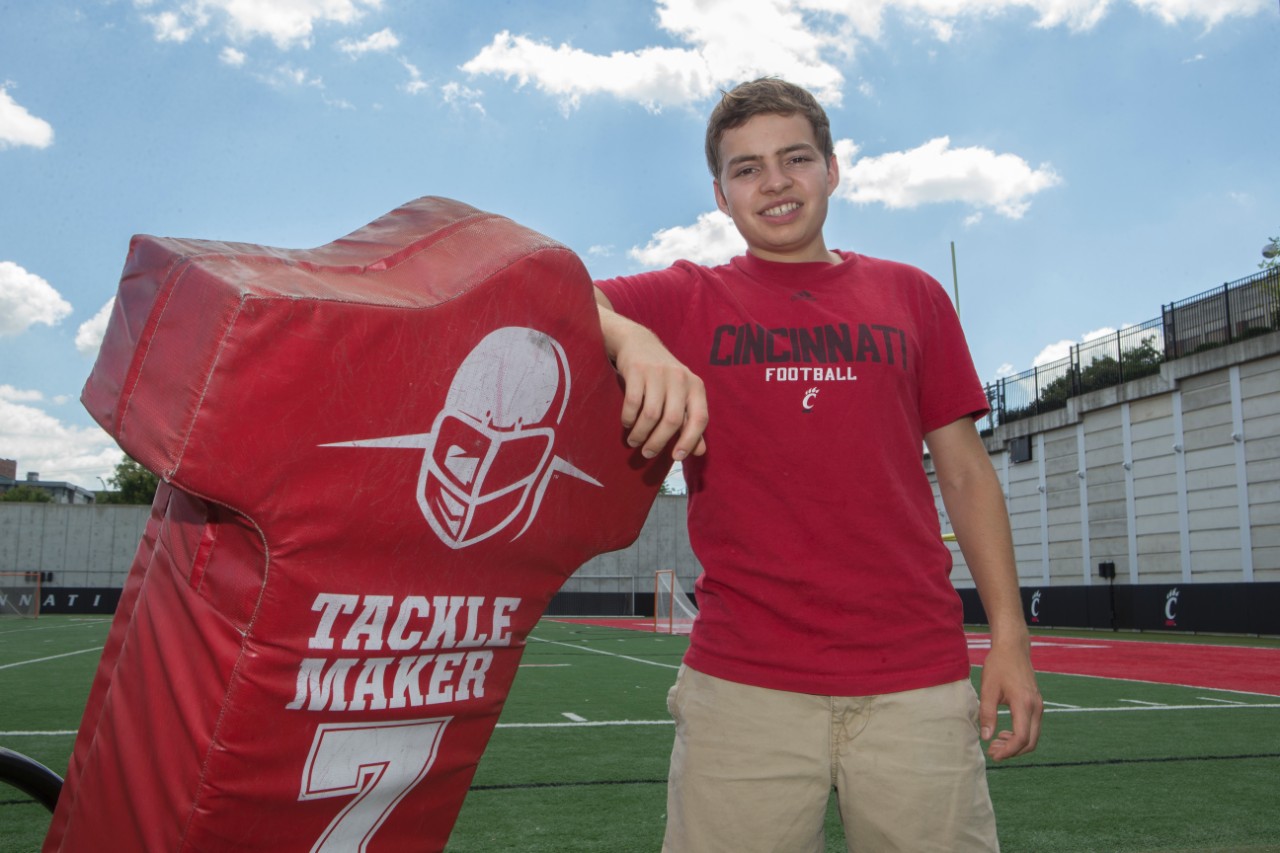Mitch Stone, standing on the grass at Sheakley Field, has been a proud Bearcat for seven years, but now he’s finally an incoming freshman to the University of Cincinnati. Photo/Joe Fuqua/Creative Services
Lucky charm
Bearcats' good luck charm returns to tackle freshman year
by Jessica Noll
513-556-1823
Sept. 12, 2016
The full student section looks like a blizzard hit the ‘Nati a bit early this year. Everyone in Nippert Stadium is decked out in white for the first home game of the season — a flurry of student spirit.
Freshman Mitch Stone, donning a white Bearcats T-shirt, stands on the sidelines in front of a crowd of cheering UC students. He looks over his shoulder at the massive, lush green football field with freshly painted white numbers illuminated by the field’s brilliant lights. The 18-year-old takes it all in, turns back to the rowdy student section and begins to lead, the notable “Down the Drive” cheer.
Cheerleaders grip their black and red pompoms and their massive megaphones, repping the Bearcat C-paw logo, ready to join in on the spirit.
The swarm of students’ in-sync clapping commences into, “Ohhhhhhh!”
Everyone leans in, bounces and rolls their fisted arms to the right. Then, “Ohhhhhh!” as they roll to the left. And back to the right, “Ohhhhhhhhh!” ending with four hearty claps.
Clap!
Clap!
Clap!
Clap!
A collective and enthusiastic, “U-C!” is yelled as the stands are filled with fans on their feet who create the "U" with their arms above their heads and the "C" the left.
“Yea! Hey! Cats! Let’s go U-C!”
The University of Tennessee at Martin Skyhawks were no match for the Bearcats, with a final score of 28-7 on Thursday, Sept. 1 during the home opener. Seems like UC’s good luck charm was back and this time, he too was an official Bearcat.
It’s a moment, Stone wasn’t sure he’d get to see come to fruition.
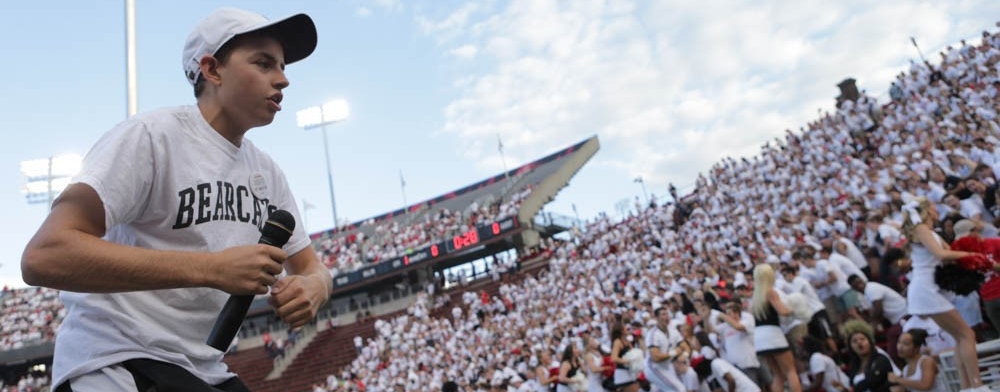
Mitch Stone leads Down the Drive cheer at football game during the season opener at Nippert Stadium. Photo/Andrew Higley/UC Creative Services
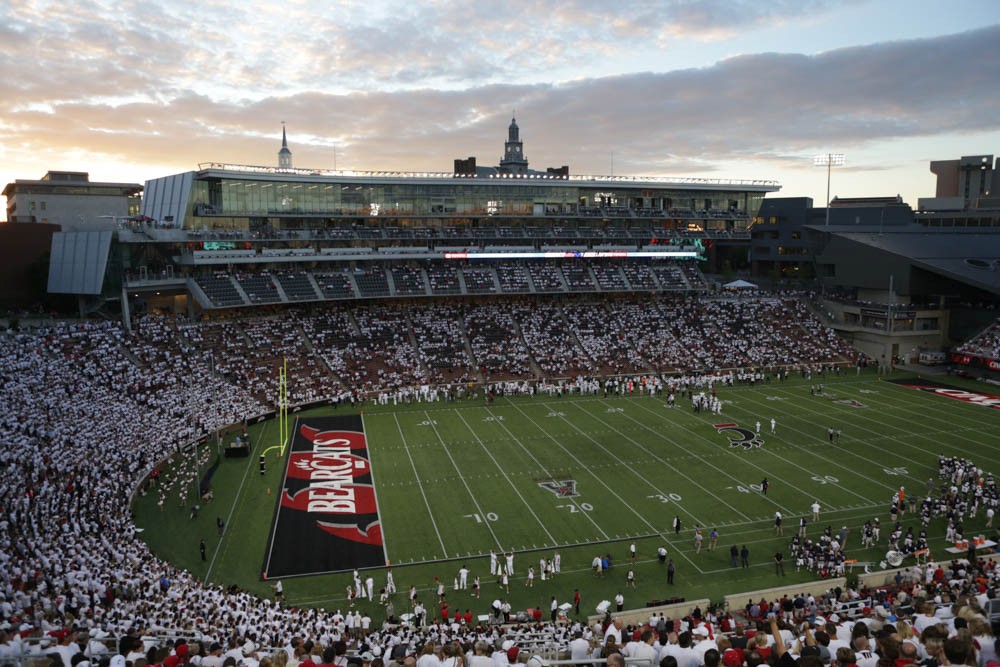
Seemed like UC’s good luck charm was back, and this time, he too was an official Bearcat. The University of Tennessee at Martin Skyhawks lost to the Bearcats, 28-7 on Thursday, Sept. 1. Photo/Andrew Higley/UC Creative Services
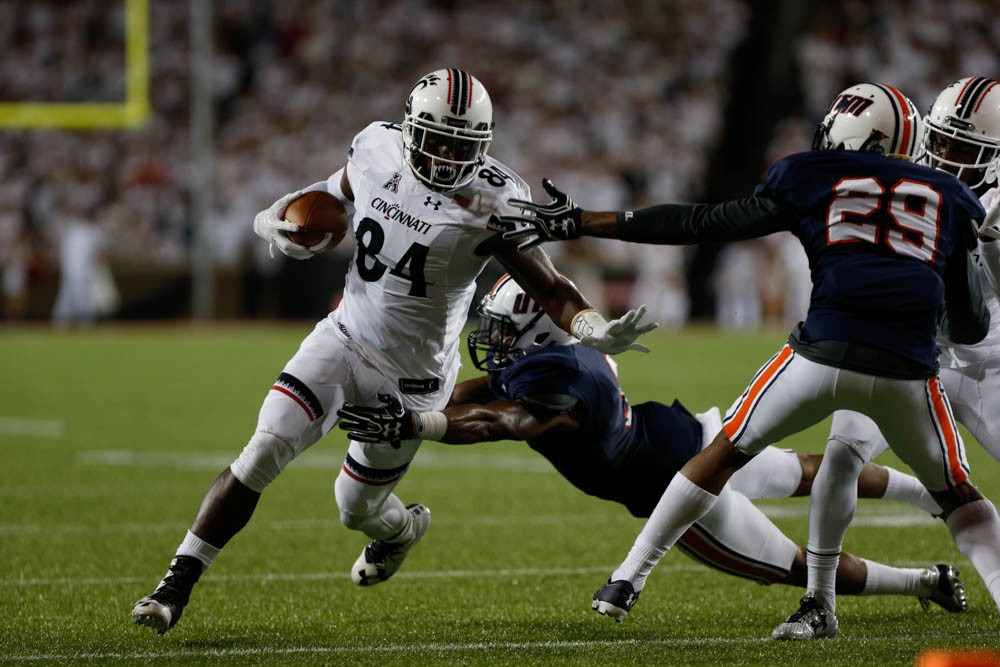
The University of Tennessee at Martin Skyhawks were no match for the Bearcats, with a final score of 28-7 on Thursday, Sept. 1. Photo/Andrew Higley/UC Creative Services
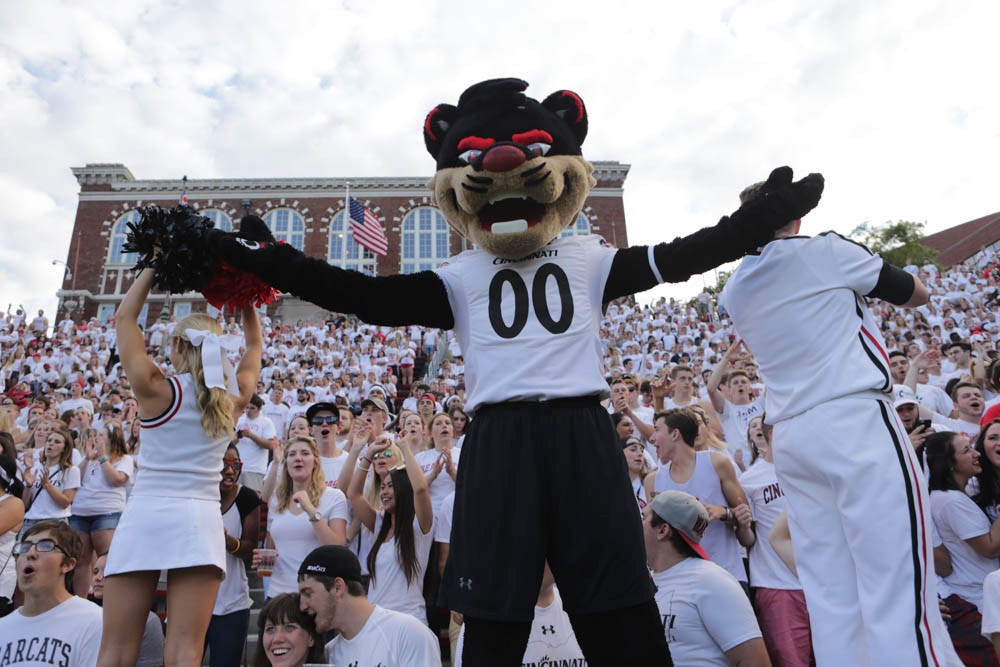
The Bearcat and cheerleaders get the students revved up at the home opener on Sept. 1, 2016, at Nippert Stadium. Photo/Andrew Higley/UC Creative Services
A family forever changed
When he was 12-years-old, the University of Cincinnati’s Bearcats football team took Stone under their wing. Back then, he was full of spunk, big smiles and sported a shaved head. He could be spotted at most games wearing an oversized, black jersey, usually draped over him and consuming his small, frail body. The name STONE in large, white block letters spanned across his shoulder blades, just above the number 4 in bold white.
By his side on the sidelines, was his twin brother, Nick. And although he had a little more hair, the two stood side by side, the same height and wearing the same ear-to-ear smile.
The team would, with Mitch’s enthusiastic school spirit in tow, go on to win an undefeated regular season in 2009. It was an unprecedented year for the Bearcats, who gave Mitch credit as their good luck charm.
But Mitch’s battle wasn’t on the field.
Mitch’s mom, Dee remembers the scariest moment of her life and the question that plagued the entire family. One day, Nick looked up, with tears streaming down his face, and asked her, “Is Mitch going to die?”
“Is Mitch going to die?” she questioned herself out loud.
In 2008, the Stones were living their lives like so many others. School, sports, juggling schedules for four kids.
But in September, the Anderson Township, Ohio, family would never be the same.
Mitch, 11, started complaining of headaches. He was vomiting, and his vision was impaired during the worst of his headaches. Dee didn’t think too much of it since his older sister suffered from migraines. So, she took Mitch in for treatment. That worked for a while.
In February 2009, he came home from school and his left eyeball was turned inward. He looked at Dee, but his left eye looked like he was crossing his eyes. Scared, she looked at her son, hoping that he was joking with her and said, “Mitch, stop doing that. That’s not funny.”
He said, “No, mom. I’m not doing it on purpose.”
“And that’s when we knew,” she says. “It was the worst day of my life. It’s like someone kicks you in the gut,and you can’t believe it’s actually happening to your kid and your family — because it is the family. It turns into a family disease.”
Then the question became, “OK, what do we do now?” she remembers.
She rushed her son to his pediatrician, who told them to get to Cincinnati Children’s Hospital Medical Center immediately.
“Luckily, we have Cincinnati Children’s here. I mean that made all the difference,” Dee says. “I count it as one of the biggest blessings to our family.”
Turns out, he had a PNET (primitive neuroctodermal tumor), which is a tumor that’s usually in the back of the brain and is the most common malignant brain tumor in children, says Dr. Maryam Fouladi, medical director of the Brain Tumor Center at Children’s and a professor with UC Department of Pediatrics. However, in Mitch’s case, the tumor was in the upper part of his brain instead of the back, which made his a supratentorial PNET.
It was cancer.
Within four days of being admitted, Mitch had his fist-sized tumor removed. And didn’t leave Children’s for the next few months.
“I was confused. I didn’t really know what a brain tumor was when they told me,” Mitch recalls. “All I knew is that I had to get through it. I was just looking toward the end; how can I get over this and move on back to my regular life in the fifth grade.”
“[But] things totally changed after that. It’ll never be the same,” he recalls thinking.
While his type of tumor was typically responsive to both radiation and chemotherapy, his doctor had to strike the right balance to make sure that he wasn’t just surviving, Fouladi says, but that they were also preserving the life he once had and would have again after Children’s.
While undergoing treatment, he had an allergic reaction to one of the drugs he was given during chemotherapy, and he ended up in the ICU.
“That’s when you could really see what he was made of,” Fouladi remembers. “He had eye swelling, lips swelling, difficulty breathing so that’s why we took him to the ICU to monitor him there. Things settled down, and we managed to get him through the cycles of chemotherapy, but he had a rough road of it. But I remember always going in and asking him, ‘Mitch, are you OK?’ He responded, ‘Yes, I’ll be fine. I’m fine.’”
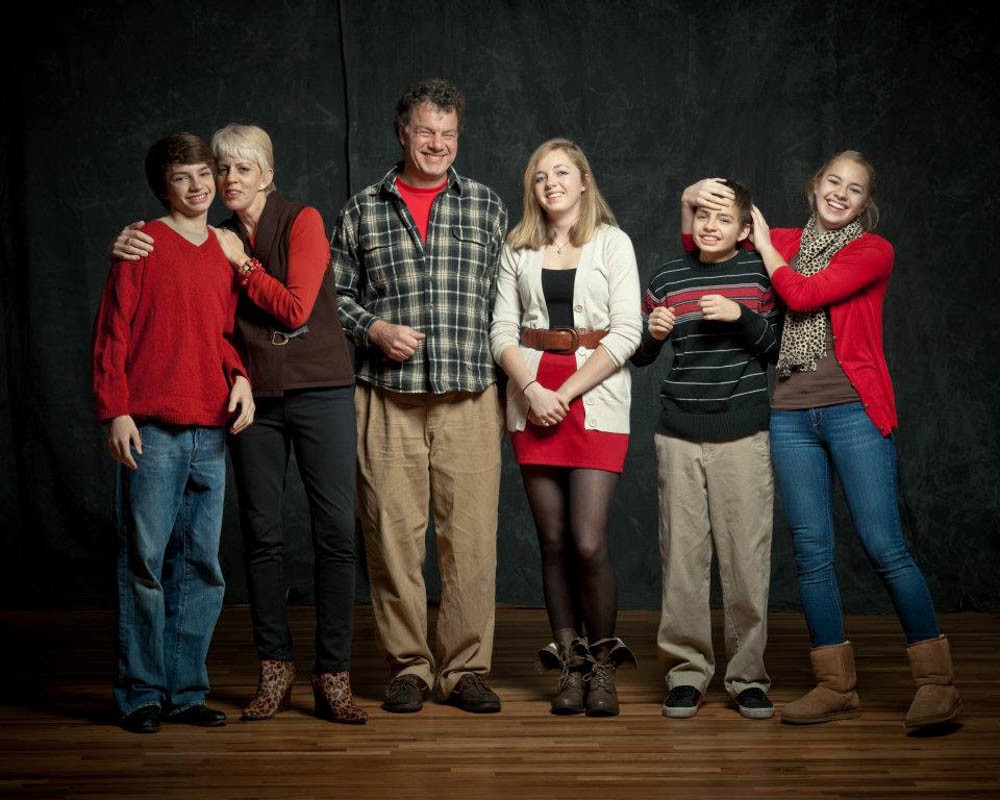
The Stone family in 2012, during Mitch's 8th grade year. Photo/Provided
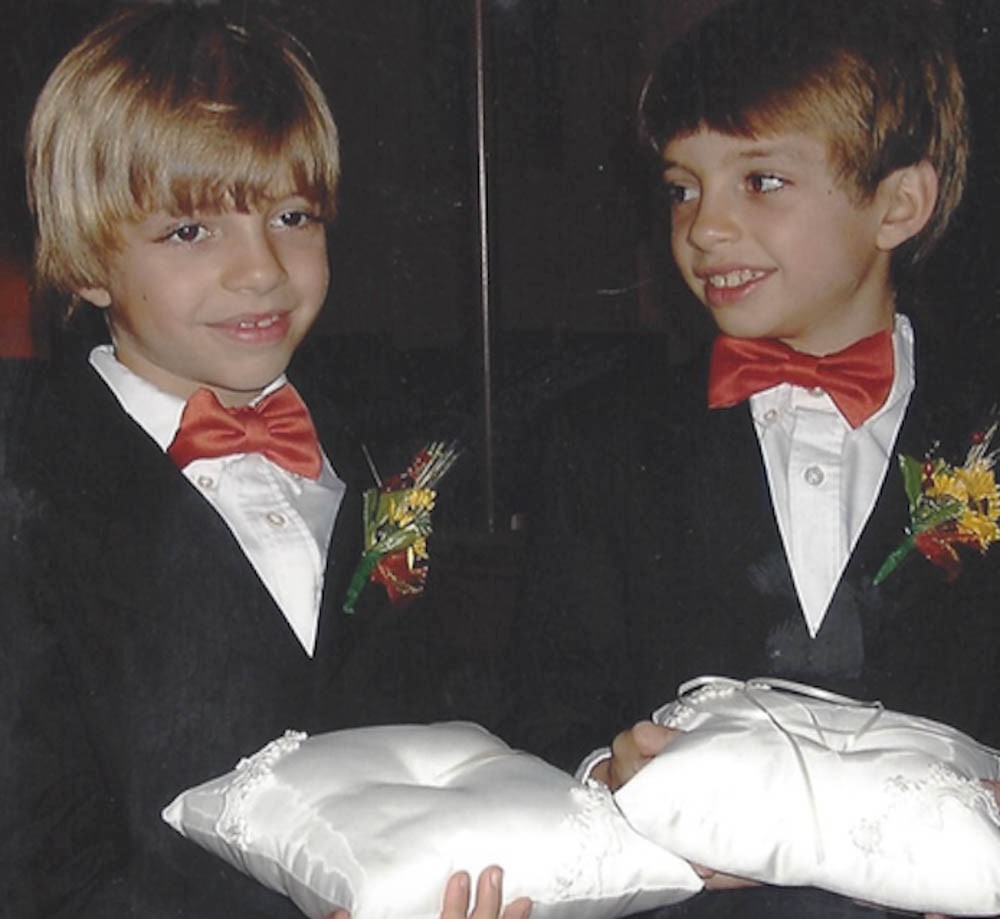
Nick and Mitch Stone as dual ring bearers. Photo/Provided
“I think the beauty of Mitch and his family is that they always looked at the goal. Even though there were bad days, there were great days, and on those great days they savored it. They appreciated it. It’s almost like they built up a bank of faith and time and everything for the bad days. And they just got through it."
— Dr. Maryam Fouladi, medical director of the Brain Tumor Center at Cincinnati Children’s Hospital Medical Center
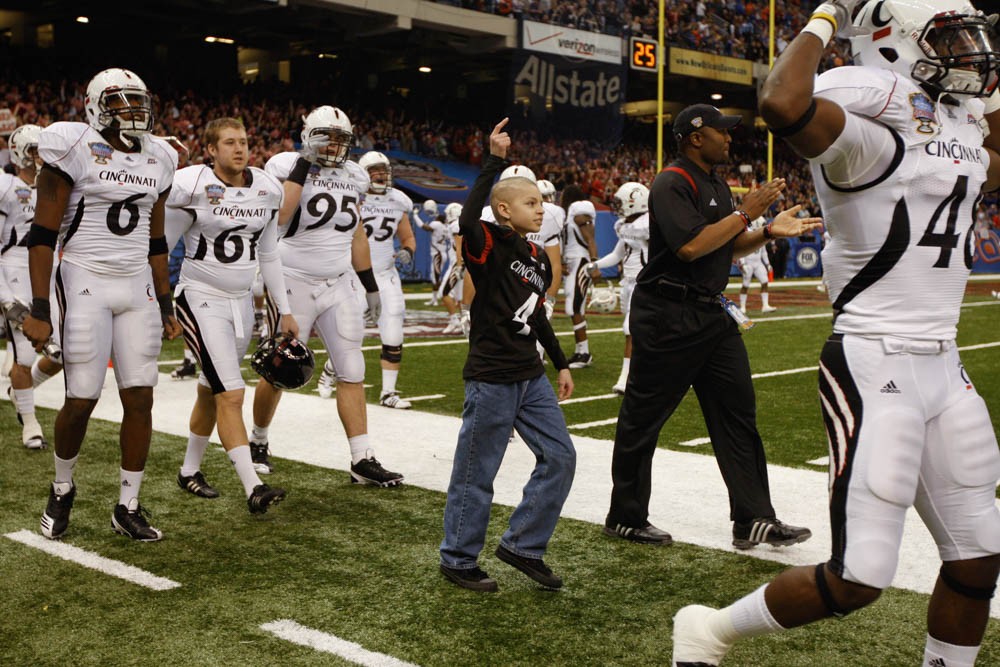
Mitch Stone walks onto the football field with the team in 2009 during the Sugar Bowl in New Orleans. Photo/Lisa Ventre/UC Creative Services
Good luck charm
Even though Mitch was able to leave Children’s after a few months, the treatments were far from over. In fact, he was out of school for a year. But while he was still admitted to Children’s, something incredible happened, that would again, change his life and lift his and his family’s spirits.
He was selected by Friends of Jaclyn, a foundation that sets up children with brain tumors with a sports team.
At first, he didn’t want to do it, says Dee. But with a little coaxing from his family, he gave it a shot and talked to them. Sitting in the hospital day in and day out, his mom really wanted him to get out and try something that could help raise his spirits and give him some much-needed inspiration.
In July 2009, the UC Bearcats football team adopted Mitch, giving them a season they’d never forget.
Bearcat No. 76, the left guard on the offensive line, Austen Bujnoch remembers his team’s good luck charm that season and the day they officially adopted him. They held a ceremony in their team room, and they all stood up, giving Mitch a standing ovation to welcome him to their team.
“You could tell he was so happy to have big brothers who had his back throughout his battle,” says Bujnoch, now 25, and working at UC coaching as a graduate assistant working with the offensive line
And in a way, Mitch adopted them. He started going to their summer practices, gearing up for the fall 2009 season. He unwittingly gave them the inspiration they needed to push a little harder.
“Even when Mitch couldn’t attend practice he was always in our hearts, especially when things became difficult for our team. If he can fight for his life every single moment of his life, we can push that extra inch,” says Bujnoch.
Mitch was a symbol of determination for the entire team.
“We knew Mitch would never give up hope as he fought through his battle, and we knew we had to do the same for Mitch. When things seemed to be falling out of our hands we would regain ourselves and remember that Mitch was fighting for his life. We were competing on the field to win games while Mitch was battling his illness. We knew that we as a team could not take any moment for granted.”
Mitch didn’t take his time with the team for granted either. They protected his blindside.
“The football team always had my back, like on the days that I was having chemo,” says Mitch. “It was amazing. Before, I was going through the treatment, just trying to get this over with. It was a break from going to the hospital.”
They were his good luck charm, says Dee, who started to see the joy coming back into her son’s eyes.
The rush of their ever-growing winning streak took Mitch’s mind off of his treatments and pain.
“They were giving me support, calling me, texting me, sending me videos,” he remembers, with a phone they got for him.
From the sidelines, he and Nick watched their team go on to win game after game — and they watched Mitch’s unbelievable season of radiation, chemotherapy and stem cell rescues also come to a winning end: cancer-free.
“It changed everything — as far as our family and his recovery, it just changed it all. I mean we were just going through the chemo, going through being in the hospital, being at Children’s and all of sudden there was something to look forward to,” says Dee.
These days Mitch still keeps up with the players on Facebook. And they continue to cheer him on.
Bujnoch says Mitch and his outlook on life changed him for the better.
“Every moment is precious, and we have to enjoy every day we are given. Each day we have a decision to make on our attitude and how we are going to approach the day, preferably a positive attitude. When I thought I was having a ‘bad’ day I quickly thought of Mitch fighting for life every single day, and immediately my attitude changed,” says Bujnoch.
“Mitch could’ve been angry about his situation, but he chose a positive attitude. He chose to be happy and enjoy every moment of his life and that was portrayed through his facial expressions. Mitch was always smiling and enjoying his time he had with his big brothers.”
Mitch didn’t take his time with the team for granted either. They protected his blindside.
“The football team always had my back, like on the days that I was having chemo,” says Mitch. “It was amazing. Before, I was going through the treatment, just trying to get this over with. It was a break from going to the hospital.”
They were his good luck charm, says Dee, who started to see the joy coming back into her son’s eyes.
The rush of their ever-growing winning streak took Mitch’s mind off of his treatments and pain.
“They were giving me support, calling me, texting me, sending me videos,” he remembers, with a phone they got for him.
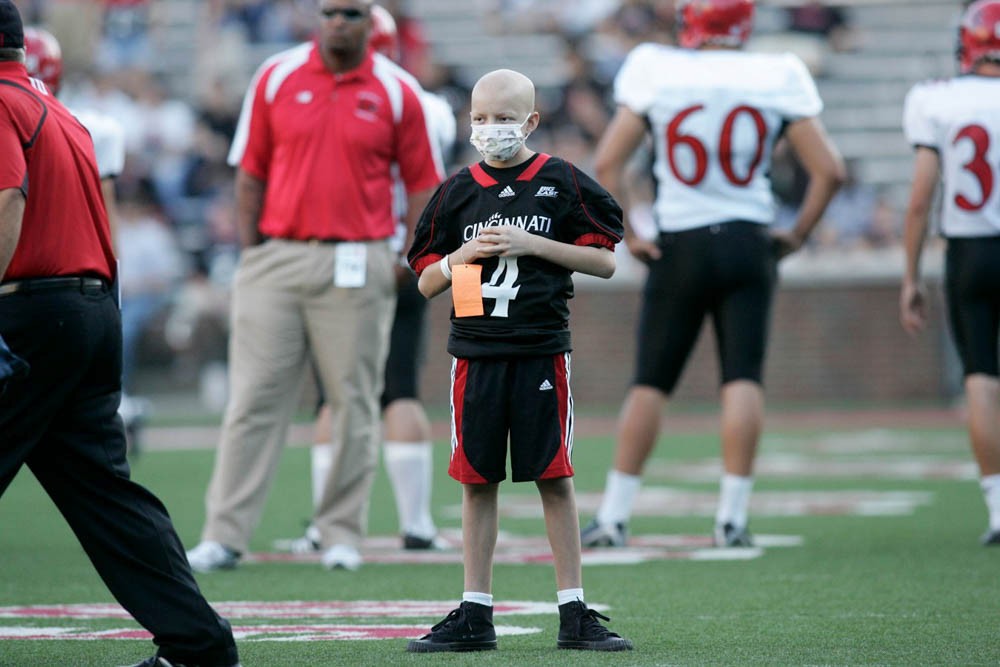
Mitch Stone remained the Bearcats' good luck charm throughout the 2009 season. And they became his. Photo/Lisa Ventre/UC Creative Services
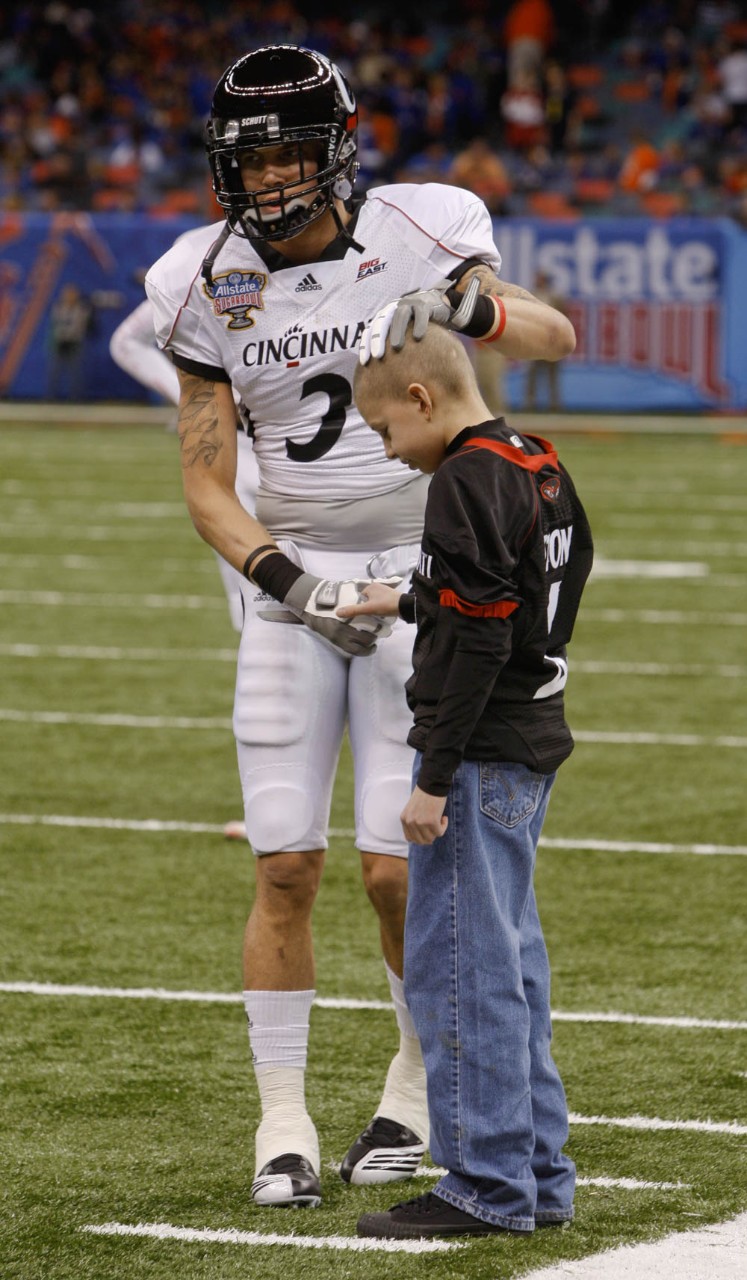
Mitch Stone with the Bearcats on the field during 2009 Sugar Bowl. Photo/Lisa Ventre/UC Creative Services
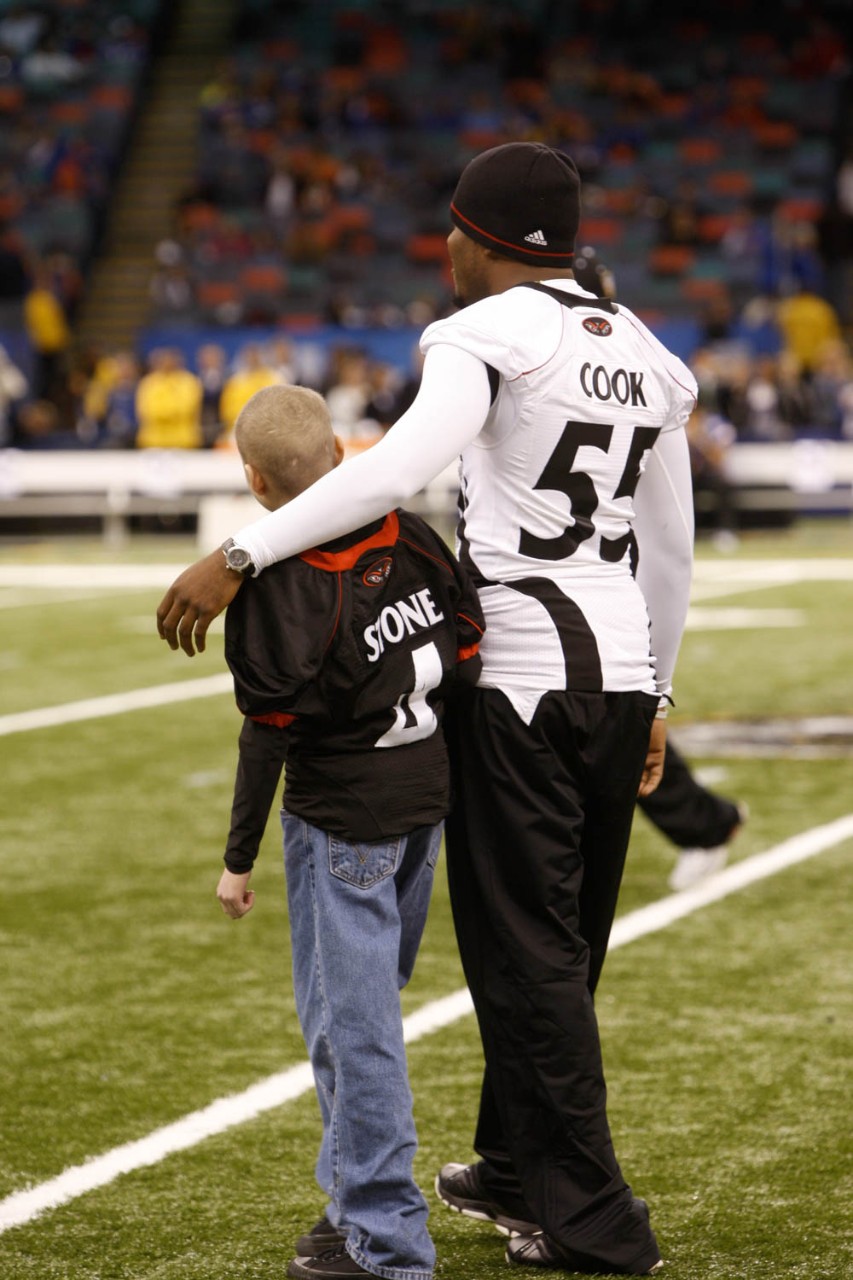
Mitch Stone and No. 55, reflect on the game on the field. Photo/Lisa Ventre/UC Creative Services
From the sidelines, he and Nick watched their team go on to win game after game — and they watched Mitch’s unbelievable season of radiation, chemotherapy and stem cell rescues also come to a winning end: cancer-free.
“It changed everything — as far as our family and his recovery, it just changed it all. I mean we were just going through the chemo, going through being in the hospital, being at Children’s and all of sudden there was something to look forward to,” says Dee.
These days Mitch still keeps up with the players on Facebook. And they continue to cheer him on.
Bujnoch says Mitch and his outlook on life changed him for the better.
“Every moment is precious, and we have to enjoy every day we are given. Each day we have a decision to make on our attitude and how we are going to approach the day, preferably a positive attitude. When I thought I was having a ‘bad’ day I quickly thought of Mitch fighting for life every single day, and immediately my attitude changed,” says Bujnoch.
“Mitch could’ve been angry about his situation, but he chose a positive attitude. He chose to be happy and enjoy every moment of his life, and that was portrayed through his facial expressions. Mitch was always smiling and enjoying his time he had with his big brothers.”
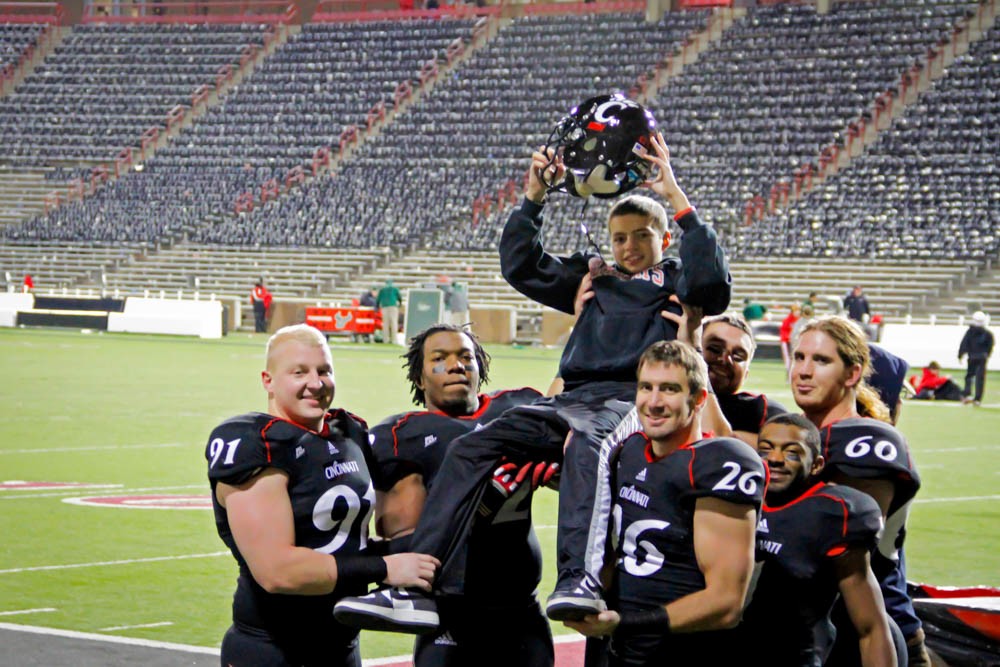
The Bearcats would go on to an undefeated regular season with Mitch Stone by their side in 2009. Photo/Stacie McLean/Cincinnati Children's Medical Center
Cancer-free and at UC
Mitch stands next to his twin brother these days, with a noticeable 7-inch height difference due to the radiation treatment that stunted his growth — but they still share their identical smile. Over the last seven years, they’ve also shared homecomings, proms, track and cross country meets, movie nights, family portraits, senior night and high school graduation. Together, they filled photo albums chock full of memories that the Stones, at times, weren’t sure they would have with Mitch.
But not Dee. Her faith has been unshakeable.
“I always had a lot of faith that he’d get better. I just always thought, ‘He’s going to get better. We’re going to do what they tell us, and he’s going to get better.’”
Beyond her faith and all the events that they have shared as a family, comes his biggest new beginning. College.
One word that describes his first semester at UC: Opportunities.
“[There’s] a lot of new doors,” says Mitch.
While Mitch still has annual checkups, he’s been done with treatment and cancer-free since Halloween 2009. And now, he’s back at UC to begin a new journey toward his future.
“[UC] is a place where my whole family has gone and I am soon to be. It has a long history with the Stone family. It’s a place of support, where I can go to the games and see a lot of people I know. A lot of my friends go here too.”
The now-18-year-old, who has served on the patient advisory counsel at Children’s since his freshman year of high school, will major in operations management and hopes to be a hospital administrator.
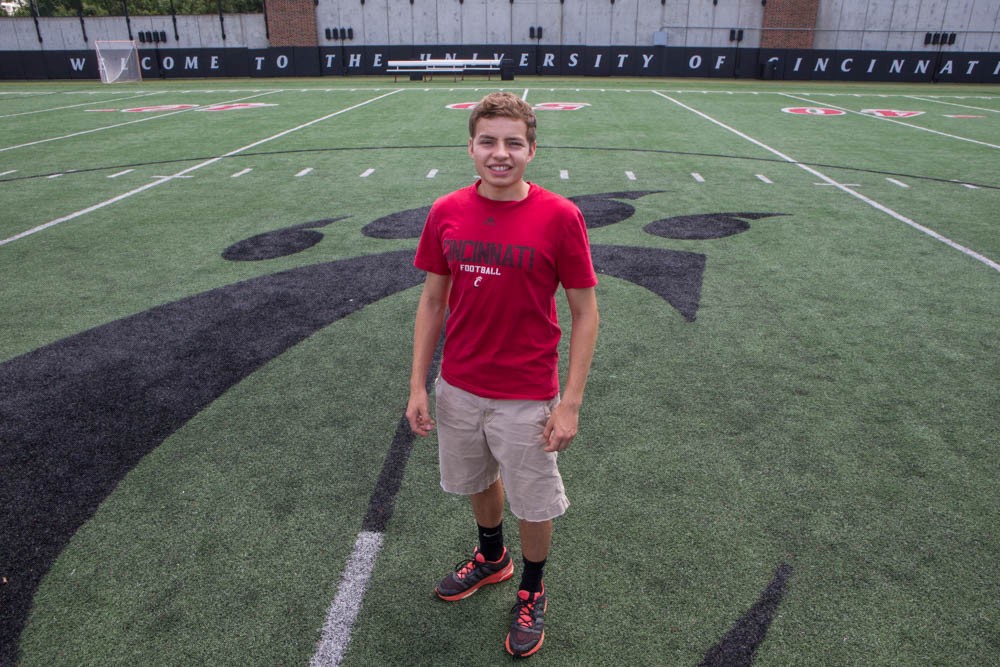
Mitch Stone, 18, stands on Sheakley Field before starting his first semester as a Bearcat this fall. Photo/Joe Fuqua/UC Creative Services
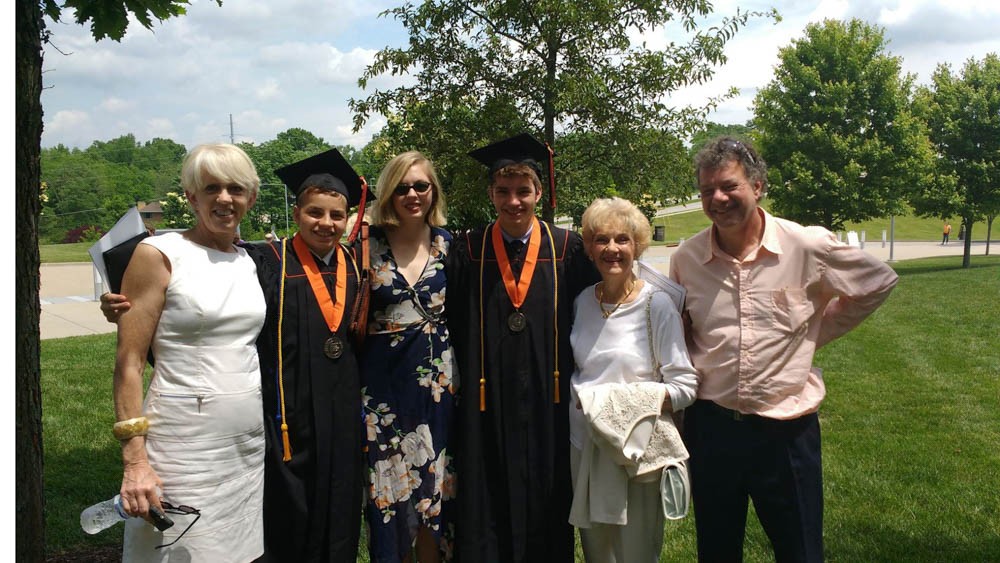
The Stone family at Mitch and Nick's graduation. Photo/Provided
“I think there’s a lot of opportunity in that area, and I think I could do a lot,” says Mitch, who’s brother Nick started at Ohio State University this fall.
“I’ve always been a really big Bearcats fan. I’ve always really loved the campus — and I actually had gone to one of the business premiere programs, the KBS program, and I’m really proud of that. And I just decided to pull the trigger and go here.”
He’s part of UC’s KBS (Kolodzik Business Scholars), an honors business program with the Carl H. Lindner College of Business.
As a matter of fact, he didn’t apply to any other schools. UC was it for him.
“I knew I wanted to go here. It’s almost like a part of me. I really love Cincinnati. I just thought about it, and I thought, this is definitely the place I want to go,” says Mitch, who is living on campus in Morgens Hall.
“It’s like coming home for you, in a way,” Dee says to Mitch. “This has been your home. This and Cincinnati Children’s. There’s something to that.”
He has been an inspiration in so many ways to so many people, including his medical team.
“Mitch is an incredible young man, says Dr. Fouladi. “I think we can all learn from Mitch. I’m so very proud he’s done so well. He’s pursuing his dreams, and we hope he can come back and work with us one day.”
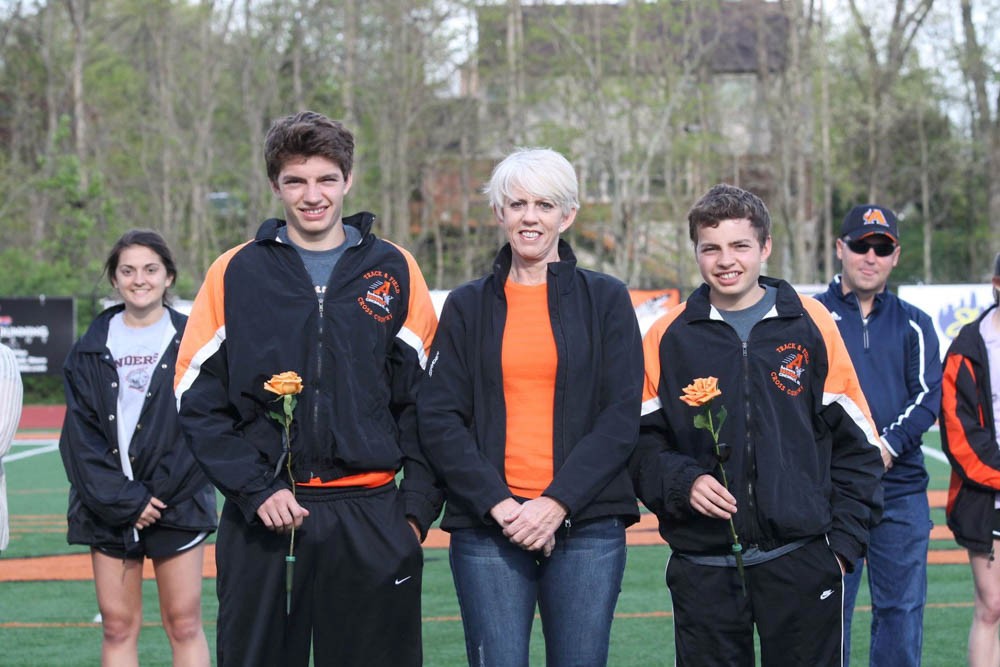
(L to R) Nick, Dee and Mitch Stone at Anderson High School's Senior Night 2016. Photo/Provided
Mitch's Mission
In an effort to give kids just like him a fighting chance and enjoy their lives amidst their unpleasant treatment, Mitch, who was 12 at the time and was just in remission, created an organization called Mitch’s Mission.
“It’s a way for us to give back to the community,” says Mitch. “We wanted to do something that would help, not only Cincinnati Children’s, but also all of the patients.”
His mission was to raise money for Children’s, earmarked for Camp Joy. Each year, Children’s sends patients from the Cancer and Blood Disease Unit to Camp Joy with a sibling to enjoy summer camp for a week for free. It includes the treatments and doctors that they need to go with them to the camp as well.
Mitch was able to go to Camp Joy for five years and was able to take Nick with him.
“They loved it. Kids undergoing treatment can go and be regular kids for a week,” says Dee.
To date, they have raised $75,000 through their Playdate with the Bearcats event, held each year in February inside UC’s Campus Recreation Center.
Organizers invite the football team and other athletes with UC to come out and interact with the families. Activities include cornhole, a silent auction, rock climbing, basketball, swimming in the lazy river, carnival-style games and plenty of food.
The event grew out of Mitch’s connection with the football team and his desire for other kids to have the same kind of experience, says Dee.
The first year it was mainly football players, Mitch says, but now it’s evolved into several UC sports teams and organizations, including lacrosse, swimmers and student government — and it’s grown every year.
Eventually, he’d like to create a student organization around Mitch’s Mission right on campus so that other students can volunteer with Children’s and help strategize new fundraising ideas.
“I’m doing well. I’m healthy. I’m a good guy, I guess. I just want to do some good with the university,” says Mitch, who’s dream is to graduate from UC and travel.
“I definitely take everything day by day and live in the moment — but also, look toward the future. It helps you keep faith and helps you stay focused.”
And that’s his message for any child who might be going through what he endured.
“Remain focused that you will get better. Keep the positive energy, because if you believe, it’ll definitely help. It will help the people around you, that you’re getting better.”
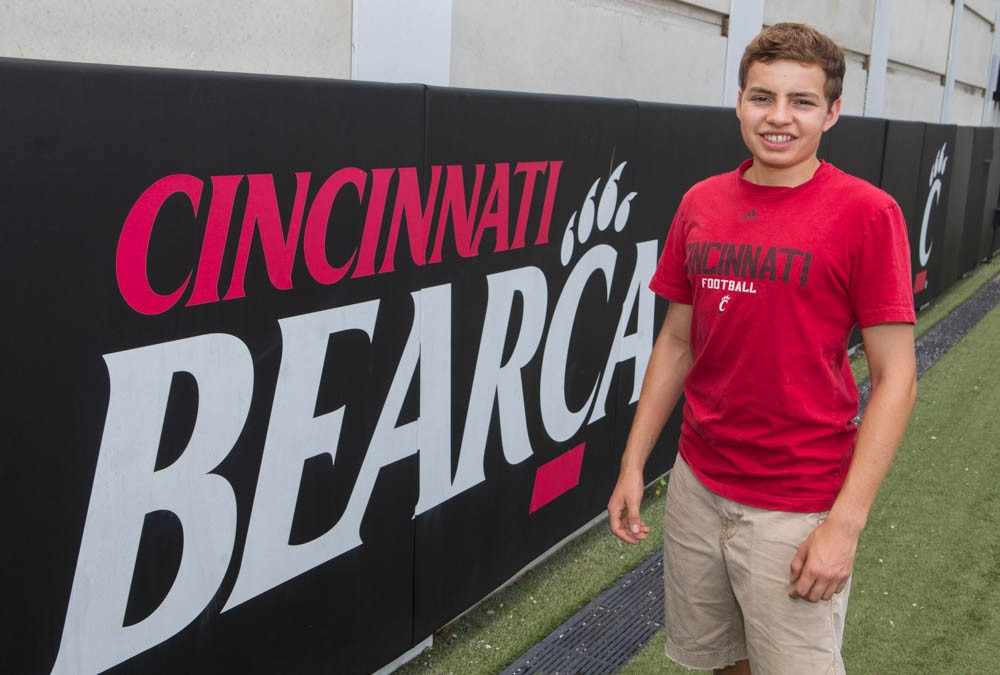
Mitch Stone, 18, stands on Sheakley Field before starting his first semester as a Bearcat this fall. Photo/Joe Fuqua/UC Creative Services

